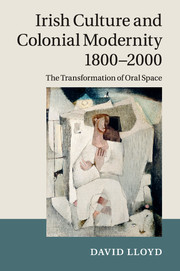Chapter 5 - The breaker’s yard
from forensic to interrogation modernity
Published online by Cambridge University Press: 07 October 2011
Summary
In the sealed hotel men are handled
as if they were furniture, and passion
exhausts itself at the mouth.
Medbh McGuckian
I
The Northern Irish prison struggles, which to a large extent anticipated and set a pattern for political prison struggles that are ongoing in the era of the war on terror, were in every respect a phenomenon of modernity, though of a modernity whose forms have shifted and modified in the faltering era of neo-liberalism. As a philosophy which, like nineteenth-century political economy, was at once economic and political and envisaged a particular form of state, neo-liberalism rose to dominance coincidentally with the Troubles in Northern Ireland, in the wake of the fiscal crisis of the early 1970s. If its economic prescriptions face crisis in our own moment, it has not failed to bequeath to the present its political and security apparatus, shaped as these were around the passage from a hegemonic welfare state to a state of privatization and forced expropriation. The previous chapter explored the contrapuntal emergence in the course of Irish anti-colonial struggles of a modern penal system with its disciplinary architectures and of the strategies and tactics of resistance conditioned by its various architectural forms, from the prison camp to the cellular jail. But the story of Irish political imprisonment and resistance is also part of the larger story of the emergence of the modern state and, in and through the recent Troubles, of the emergence of the new British and, increasingly, of the global ‘strong state’.
The H-Block prisoners consistently transformed the terms of their imprisonment, inverting the confined interior of the jail into a metaphorfor the condition of Northern Ireland as a whole and the jail itself into a space of regained freedom. The ghettoes of Derry or Belfast were, for them, spaces analogous to those they inhabited within the larger colonial apparatus of surveillance and regulation of movement. This was not a merely rhetorical claim, but one that recognized the ways in which modernity replicates the disposition of space across diverse architectural domains. Prisons may be seen, as they are in Foucault’s Discipline and Punish, to represent the quintessential form of the modern disciplinary apparatus. But it is important to recognize that the prison, for all its appearance of specialization of function and spatial hermeticism, is in most respects continuous with other forms and terrains of discipline that emerge within the capitalist state. It aligns not only with factories and barracks and schools, as Foucault so thoroughly demonstrates, but with the modern city itself, as a site of biopolitical organizing of the population under conditions of regulated movement, surveillance and architectural rationality. The cellular seriality of the prison block, after all, intimately resembles in miniature form the serial array of urban housing along straightened boulevards or the terraced dwellings of new industrial cities. What I will suggest in this chapter is that the primary icon of modernity, the city, with its crowds, its streets, its movements and its flâneurs or detectives, has been displaced within our later modernity by the site that was always its shadowy counterpart, the prison, with its inmates, its corridors, its cells and its interrogators. The segmented, regular spaces of the ‘lettered city’ that represent the ideal order set against the through-otherness of the clachan’s oral space, give way here to the numbered enclosures of coerced speech and pained bodies.
- Type
- Chapter
- Information
- Irish Culture and Colonial Modernity 1800–2000The Transformation of Oral Space, pp. 166 - 197Publisher: Cambridge University PressPrint publication year: 2011



